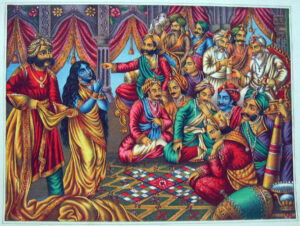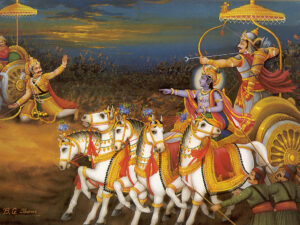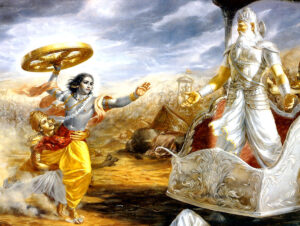In its most recent survey on the subject of God, the National Centre for Social Research found that some ninety percent of us claim to be believers. One in five even said they had no doubts about God’s existence. Such statistics are perhaps surprising, given that education today tends to steer us toward more atheistic notions such as the’ Big Bang’ and evolution. Surprising also in the face of the widely touted suggestion that religion is the cause of most conflicts, a suggestion seemingly reinforced by the ferocity of some
Author Archives: Krishna Dharma
The Supreme Person
How to really be happy this Christmas
→ Krishna Dharma
Ho ho ho.
When we send our children to school obviously we hope that they will be taught the truth. Well, at least some of the time. It seems that painful truths may have to wait, such as the non-existence of Santa Claus. A teacher who recently made the grave error of informing children in her class that Father Christmas was not real found herself out of a job. Parents were furious. “My Joshua came home in tears,” said one anguished mother. “I didn’t know what to say.”
We want our
Winning life’s battles
→ Krishna Dharma
The first question often asked about the Bhagavad-gita is why was it spoken on a battlefield? Despite a common view that religion is a major cause of war, the general view is that the two should remain separate. Religion or spirituality should result in peace not conflict. If one’s spiritual practises bring about the bloodthirsty desire to eliminate the followers of some other faith then they must be suspect. That would surely seem to make sense.
Nevertheless the Gita did arise from a war, the great Battle of Kurukshetra. Not only
Mahabharata class part 3 Hungary August 2015
→ Krishna Dharma
Mahabharata class from Hungary Part Two
→ Krishna Dharma
Mahabharata classes August 2015 Hungary. Part one
→ Krishna Dharma
Is this progress? (Pause for Thought)
→ Krishna Dharma
My trip to India brought a few surprises. It’s been some years since I was last there and things are changing fast. The cities are still the same bustling mess of teeming madness, much like anywhere else I suppose, but it’s in the outlying rural areas that I was most shocked. In my many visits to India I’ve always headed straight for a small village called Vrindavan, the most sacred place for Hindus where Krishna appeared some 5000 years ago. Last
Mahabharata audio book
→ Krishna Dharma
Mahabharata: The Greatest Spiritual Epic of all Time is now available as an audio book. Over 45 hours of narration. Click here
The Chaste Wife
→ Krishna Dharma
There was once a wicked man of the lower classes. He abandoned all holy rites and gave himself to sin. He had a young wife but also kept a prostitute in his house. The wife, wishing only to please him, served them both. She washed their feet and ate only the remnants of their food. Although the prostitute tried to prevent her she continued to serve that woman in every way, along with her husband. When they lay together in bed the wife would lie nearby on the bare ground. In
Wasting my rare human birth.
→ Krishna Dharma
DURLABHA MANAVA JANMA
by
BHAKTIVINODA THAKUR
1.
durlabha manava-janma labhiya samsare
krsna na bhajinu — duhkha kahibo kahare?
Born in this rare human body, I did not worship you.
Now Lord I am left lamenting. Who shall I tell this to?
2.
‘samsar’ ‘samsar’, ko’re miche gelo kal
labha na koilo kichu, ghatilo janjal
My time passed in wordly pursuits, without the slightest gain.
My one and only profit was pure anguish and pain.
3.
kiser samsar ei chayabaji pray
ihate mamata kori’ brtha dina jay
This world has no more meaning than a magical display.
Caught up in it with no purpose, my life passes away.
4.
e
If I had a Time Machine (Pause for Thought BBC Radio 4 June)
→ Krishna Dharma
Hello officer, I seem to be lost.
We seem to have something of a fascination for time machines, if the success of Dr Who, Back to the Future, and numerous other such shows are anything to go by. H.G.Wells started it all off many years ago, and maybe when we do finally work out how to do it, someone could pop back and tell him how well his book, ‘The Time Machine’, is still doing.
Wells sent a man one million years into the future, but if I had a time
Courage (Pause for Thought. BBC Radio 2. May 28)
→ Krishna Dharma
I remember back in the sixties when the words ‘take courage’ were the ubiquitous advertising slogan for a beer of the same name. Quite a nifty publicity idea, I suppose, but a few years ago when it was resurrected in a TV campaign it was banned. The censors quite rightly concluded that encouraging us to drink beer to increase our confidence might not be the best example of social responsibility.
Courage means standing up for what we believe to be right. Intoxication, on the other hand, tends to make us blur
The greatest gift (Pause for Thought, BBC Radio 2, 21 May 2015)
→ Krishna Dharma
When my children were small they pooled their resources one year to purchase for my birthday a fine looking tie pin in the shape of a golf bag and clubs. Actually I’ve never played golf in my life, and as far as ties go, since my schooldays when they were obligatory, I have made a point of avoiding them. Anyway, although the tiepin was of little use to me I was thrilled to receive it, as it was given with love. I still have it safely stored in my very
How to cheat death
→ Krishna Dharma
King Ambarish had a very sinful brother who could not be changed. The pious Ambarisha tried repeatedly without success. His brother, Paparaja, would not stop sinning and simply laughed at Ambarish. One day the saint Narada Muni came to see Ambarish and the king asked him to preach to his brother. “Perhaps, O great one, you can turn his mind.”
But when Narada went to see Paparaja he simply hurled insults at him, so Narada decided to leave. As he was going he said, “Please just take this one piece of
Journeys (Pause For Thought, BBC Radio 2, May 14, 2015)
→ Krishna Dharma
Life today is full of journeys, it seems. Most of us could hardly survive without our cars and think nothing of a fifty or sixty mile trip, a good two day walk in olden days. For many of us, there’s the daily commute which here in London where I live is less of a journey and more of a battle to the near death. Thankfully I only have to go twenty or so miles, but a lot of people nowadays have to commute as much as a hundred miles and
What is Victory (Pause for Thought BBC Radio 2 May 7th)
→ Krishna Dharma
Over the years my idea of victory has changed somewhat. In my younger days, filled with the naïve certainty of youth, I saw myself conquering the world, acquiring vast riches, fame and all that sort of thing. That ambition has been rather tempered by reality, as it tends to be, but thankfully I no longer see world conquest as even a desirable victory.
How I see success depends of course on my values and as a young man material achievements were high up on my list. This tends to be the
How to see God (Pause for Thought BBC Radio 2 April 30th)
→ Krishna Dharma
God’s incomparable artistry
In the spring a young man’s fancy lightly turns to thoughts of love, as Tennyson so delightfully said. Of course nowadays, bombarded as we are with suggestive images on all sides, it might turn the way of love rather more often than just in spring.
Certainly though, spring is the season of reproduction, when nature renews herself and gives forth of her best. In the Bhagavad Gita, Krishna says, ‘Amongst seasons I am flower bearing spring.’ In other words this is the season when we can most easily
What is Love (Pause for Thought, BBC Radio 2, April 23, 2015)
→ Krishna Dharma
I have mixed feelings about Shakespeare. Memories of my schooldays and the obligatory Hamlet studied from every angle left me with a bit of a jaded view. But since then I have grown a lot fonder of the Bard. His remarkable gifts aside, he made some astute moral and indeed spiritual observations. I am a great fan of his sonnets and particularly like the one, number 146 no less, where he describes love. There he penned the immortal line, “love is not love which alters when it alteration finds.” He


